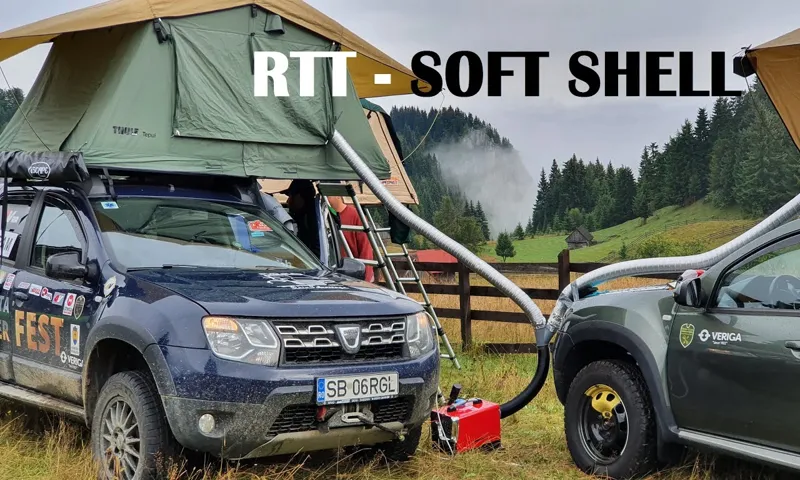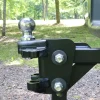If you’re an outdoor enthusiast who loves offroading, then you know that a reliable and durable vehicle is essential for tackling challenging terrains. But have you ever considered how a roof top tent could impact your offroading experience? Well, let’s dive in and explore how this popular camping accessory can affect your adventures. A roof top tent, as the name suggests, is a tent that is mounted on top of your vehicle’s roof.
It provides a comfortable and convenient sleeping space while you’re out exploring the great outdoors. But how does it affect offroading? One of the primary ways a roof top tent affects offroading is the added weight on top of your vehicle. Depending on the model and size of the tent, it can range from 100 to 200 pounds or more.
This additional weight can have an effect on your vehicle’s handling and stability, especially when navigating through rough and uneven terrains. It’s important to consider the weight capacity of your vehicle and make sure it can handle the extra load before installing a roof top tent. Another factor to consider is the increased height of your vehicle with a roof top tent.
While this can be advantageous for better visibility and a commanding view of the surroundings, it can also affect the vehicle’s center of gravity. The higher center of gravity can make your vehicle more prone to tipping over or swaying when driving on steep inclines or off-camber sections. It’s crucial to be mindful of this and adjust your driving techniques accordingly to ensure safety on the trails.
Moreover, the aerodynamics of your vehicle can be altered with a roof top tent. The tent creates additional wind resistance, which can result in decreased fuel efficiency and increased drag. This can impact your offroading experience, especially if you’re planning on covering long distances or driving at higher speeds.
It’s essential to be mindful of your vehicle’s fuel consumption and make adjustments as necessary. At the same time, a roof top tent can offer numerous benefits for offroaders. It eliminates the need to set up a traditional ground tent, saving you time and effort.
Table of Contents
Introduction
If you’re planning to take your off-road adventures to the next level, a roof top tent could be a game changer. These tents offer a convenient and comfortable sleeping arrangement right on top of your vehicle, eliminating the need for bulky ground tents. But how does a roof top tent impact your off-roading experience? Well, for starters, it allows you to set up camp in minutes, giving you more time to explore and enjoy the great outdoors.
It also keeps you safe from ground-dwelling creatures and potential flooding during rainy weather. Plus, having a roof top tent eliminates the need to find a flat and clear camping spot, as you can simply park anywhere your vehicle can go. Overall, a roof top tent adds convenience, comfort, and versatility to your off-roading adventures.
So, if you’re looking to sleep under the stars while on the go, consider investing in a roof top tent.
Definition of Offroading
offroading, definition

What is a Roof Top Tent?
roof top tent Intro Have you ever dreamed of sleeping under the stars, feeling the cool breeze on your face, and waking up to the sound of birds chirping? Well, if you love camping and adventure, then a roof top tent might just be your ticket to the ultimate outdoor experience. A roof top tent is exactly what it sounds like – a tent that is attached to the roof of your vehicle! It’s like having a portable cabin on wheels, allowing you to set up camp wherever you go. Whether you’re heading for a weekend getaway or embarking on a cross-country road trip, a roof top tent can provide you with a comfortable and convenient place to sleep, while also allowing you to immerse yourself in nature.
Let’s dive in and discover more about the magic of roof top tents!
Advantages of a Roof Top Tent for Offroading
When it comes to offroading adventures, having a roof top tent can provide a number of advantages. First and foremost, it gives you the ability to set up camp wherever you may find yourself exploring. Whether you’re in the middle of a remote forest or on a cliff overlooking a beautiful vista, you can simply pull over and set up your tent on top of your vehicle.
This means you can chase the perfect sunset or sunrise without having to worry about finding a suitable camping spot on the ground. Additionally, a roof top tent can give you a safer and more comfortable sleeping experience. Being elevated off the ground can provide protection from wildlife and creepy crawlies that may be lurking below.
Plus, many roof top tents come equipped with thick mattresses and insulation, ensuring a cozy and restful night’s sleep. So, if you’re an offroading enthusiast, a roof top tent can truly enhance your adventures and make for unforgettable camping experiences.
Enhanced Camping Experience
Offroading enthusiasts know that the camping experience can be greatly enhanced with a roof top tent. These ingenious tents offer several advantages that make them the perfect companion for adventurous offroaders. One of the key advantages is the elevated sleeping position.
Being above ground level not only offers better views of the surroundings but also keeps campers safe from snakes, insects, and other critters that may make their way into traditional ground tents. Additionally, roof top tents are easy to set up and take down, making them ideal for quick stops along the offroading trail. They are also built to withstand various weather conditions, ensuring campers stay dry and comfortable even in inclement weather.
Furthermore, roof top tents provide greater safety as they are elevated from potential dangers on the ground, such as flash floods or wild animals. Overall, a roof top tent is a must-have for offroaders who want to take their camping experience to new heights.
Convenience and Versatility
roof top tent for offroading When it comes to offroading adventures, having a roof top tent can provide a whole new level of convenience and versatility. One of the biggest advantages of a roof top tent is the ease of setup and takedown. Unlike traditional ground tents, which can take up valuable time and effort to pitch, roof top tents can be set up within minutes, allowing you to spend more time exploring the great outdoors.
Additionally, roof top tents can be mounted on a variety of vehicles, from SUVs to trucks, making them highly versatile. Whether you’re hitting the trails for a weekend getaway or embarking on a cross-country expedition, a roof top tent can provide you with a comfortable and secure place to rest, no matter where your offroading adventures take you. So why settle for a conventional camping experience when you can elevate your offroading experience with the convenience and versatility of a roof top tent?
Safety and Security
advantages of a roof top tent for offroading
Disadvantages of a Roof Top Tent for Offroading
One of the biggest disadvantages of using a rooftop tent for offroading is the effect it has on the vehicle’s center of gravity. By adding a tent to the roof, the vehicle becomes top-heavy, making it more prone to tipping over during off-road maneuvers. This can be especially dangerous on uneven terrain or when navigating steep inclines or declines.
Additionally, the added weight on the roof can also affect the vehicle’s handling and stability, making it more difficult to control in certain situations. Another disadvantage of using a rooftop tent for offroading is the limited visibility it can cause. With the tent blocking a portion of the roof and rear windows, it can be difficult to see obstacles or other vehicles around you.
This can increase the risk of accidents and make it harder to navigate safely in off-road conditions. Finally, setting up and taking down a rooftop tent can be time-consuming and challenging, especially in unfavorable weather conditions or when you are in a hurry. This can take away from the overall off-roading experience and make camping less enjoyable.
Increased Height and Weight
roof top tent, offroading, disadvantages, increased height, increased weight Offroading enthusiasts often consider a roof top tent as an essential companion on their adventures. With the convenience of setting up camp wherever you go, it seems like a no-brainer. However, it’s important to consider the potential disadvantages that come with the increased height and weight of a roof top tent.
Firstly, the added height can make navigation through narrow trails and low-hanging branches a challenge. It’s essential to have a thorough understanding of the dimensions of your vehicle and the tent to avoid any potential accidents or damage. Additionally, the increased weight can impact your vehicle’s handling and overall performance.
It can strain your suspension and decrease your fuel efficiency, especially when traversing steep and uneven terrain. It’s crucial to make the necessary adjustments to your vehicle to accommodate the additional weight and ensure your safety and comfort while offroading. So, while a roof top tent can be a fantastic addition to your offroading adventures, it’s important to weigh the advantages against these potential disadvantages to make an informed decision.
Aerodynamic Impact
aerodynamic impact, disadvantages of a roof top tent, offroading, Roof top tents have gained popularity amongst outdoor enthusiasts for their convenience and ease of use. However, when it comes to offroading adventures, there are a few disadvantages to consider. One of the main drawbacks is the aerodynamic impact that a roof top tent can have.
The design of a roof top tent protrudes above the vehicle, creating extra height and wind resistance. This increased drag can significantly impact the vehicle’s performance, especially when driving at higher speeds. The raised profile of the tent can catch the wind and create a destabilizing effect, making it harder to control the vehicle.
Not only does the aerodynamic impact affect the vehicle’s performance, but it can also impact fuel efficiency. The extra drag caused by the roof top tent can decrease the vehicle’s MPG (miles per gallon), resulting in more frequent visits to the gas station and increased fuel costs. Furthermore, the added height of a roof top tent can also pose a problem when traversing low-clearance obstacles on offroad trails.
Tree branches, overhangs, and other obstacles can easily snag and damage the tent, leading to expensive repairs or even rendering the tent unusable. So, while roof top tents offer convenience and comfort, it’s important to consider the disadvantages they bring when it comes to offroading. The aerodynamic impact can affect the vehicle’s performance, fuel efficiency, and increase the risk of damage.
It’s essential to weigh these factors against the benefits to determine if a roof top tent is the right choice for your offroading adventures.
Limited Interior Space
Disadvantages of a Roof Top Tent for Offroading When it comes to offroading adventures, one of the most popular options for camping accommodation is a rooftop tent. But while a rooftop tent offers a lot of advantages, it also comes with a few disadvantages that may not make it the best choice for every offroading enthusiast. One of the biggest drawbacks is the limited interior space.
Roof top tents are designed to be compact and lightweight, which means they don’t offer as much space as a traditional ground tent or RV. This can be problematic, especially if you’re planning on spending an extended period of time in your campsite or have a lot of gear to store. The compact size also means that you may not have enough room to comfortably move around inside the tent or set up a table and chairs for dining.
So, if you’re someone who values ample space and wants to spread out during your offroading trips, a rooftop tent may not be the best option for you.
Impact on Vehicle Performance
One consideration for off-road enthusiasts is how a rooftop tent affects the performance of their vehicle. Adding a rooftop tent to your vehicle does have an impact on its performance, but it’s not necessarily a negative one. The added weight of the tent can lower the vehicle’s center of gravity, which can improve stability when driving on uneven terrain.
Additionally, the rooftop tent can provide added storage space for gear and supplies, allowing you to carry everything you need for your off-road adventures. However, it’s important to keep in mind that the added weight of the tent can impact your vehicle’s fuel economy and acceleration. It’s also essential to ensure that your vehicle’s suspension can handle the extra weight and that the rooftop tent is installed correctly to maintain balance and stability.
Overall, while a rooftop tent may have some impact on vehicle performance, the benefits it provides for off-roading enthusiasts make it a worthwhile addition to consider.
Wind Resistance
wind resistance, vehicle performance Wind resistance, also known as aerodynamic drag, can have a significant impact on a vehicle’s performance. When a vehicle is moving through the air, it has to overcome the force of wind pushing against it, which can create a lot of resistance. This resistance can slow down the vehicle and make it more difficult for the engine to propel it forward.
It can also increase fuel consumption, as the engine has to work harder to overcome the drag. Imagine trying to ride a bike against a strong headwind – it takes much more effort to pedal and maintain a decent speed. The same principle applies to cars and other vehicles.
That’s why many manufacturers put a lot of effort into designing vehicles with sleek, aerodynamic shapes that minimize wind resistance. By reducing drag, the vehicle can move more smoothly through the air, resulting in improved performance and better fuel efficiency. So the next time you’re driving on the highway and notice a particularly fuel-efficient vehicle zooming past, it’s likely because it’s been designed to minimize the effects of wind resistance.
Fuel Efficiency
fuel efficiency, vehicle performance, fuel economy, fuel consumption, mileage, engine efficiency, aerodynamics, driving habits If you’re a car enthusiast like me, you probably understand the importance of fuel efficiency when it comes to overall vehicle performance. After all, having a car that guzzles gas like it’s going out of style can have a serious impact on your wallet and the environment. So, what exactly is fuel efficiency, and how does it affect your driving experience? Fuel efficiency, also known as fuel economy, refers to the amount of fuel a vehicle consumes to travel a certain distance.
It is typically measured in miles per gallon (MPG) or kilometers per liter (km/L). The higher the MPG or km/L, the more efficient the vehicle is in terms of fuel consumption. When it comes to vehicle performance, fuel efficiency plays a crucial role.
A car with good fuel efficiency can go farther on a tank of gas, saving you money and reducing the need for frequent refueling stops. Additionally, fuel-efficient vehicles tend to have lower emissions, which is better for the environment. There are several factors that can affect a vehicle’s fuel efficiency.
One of the biggest factors is the engine efficiency. Engines that are designed to burn fuel more effectively and generate more power per unit of fuel will generally have better fuel efficiency. This means that cars with newer engine technologies or smaller, more efficient engines tend to have higher fuel efficiency.
Another important factor is aerodynamics. The shape of the car and how it interacts with the air can have a significant impact on fuel efficiency. Cars with sleek, streamlined designs are generally more aerodynamic and therefore have better fuel efficiency compared to boxy, bulky vehicles.
Of course, fuel efficiency is not solely determined by the vehicle itself. Your driving habits also play a role. Aggressive driving, such as rapid acceleration and braking, can reduce fuel efficiency.
Handling and Stability
vehicle handling and stability
Conclusion
In conclusion, a rooftop tent is like the turbo boost of off-roading. It seamlessly combines comfort and convenience, taking your adventure to new heights, both literal and metaphorical. With a rooftop tent, you can sleep under the stars and wake up to breathtaking views, all while enjoying the rugged terrain below.
It’s like having a penthouse suite on wheels, transforming your off-roading experience into a 5-star adventure. So, whether you’re conquering mountains, crossing rivers, or simply navigating through the wild unknown, a rooftop tent is the ultimate game-changer. Get ready to elevate your off-roading game and embrace the unparalleled freedom and flexibility that a rooftop tent brings.
Happy trails, fellow explorers!”
Finding the Right Balance
vehicle performance, finding the right balance, impact on vehicle performance
FAQs
How does a roof top tent affect the offroading experience?
A roof top tent can affect offroading in both positive and negative ways. On one hand, it allows for greater versatility and convenience as you can set up camp anywhere. On the other hand, it can add extra weight and height to your vehicle, potentially impacting its performance and maneuverability.
Are roof top tents suitable for all types of offroading terrains?
Roof top tents are generally suitable for most offroading terrains, as long as the vehicle and tent are properly equipped. However, extreme terrains with uneven surfaces or steep inclines may pose challenges in terms of stability and safety. It is always important to assess the specific conditions and capabilities before attempting offroading with a roof top tent.
Can a roof top tent affect the center of gravity of the vehicle?
Yes, a roof top tent can affect the center of gravity of the vehicle. By adding weight on top of the roof, it raises the overall height of the vehicle, potentially making it more top-heavy. This can affect the vehicle’s stability and handling, particularly during sharp turns or off-camber situations. It is important to drive cautiously and be aware of these changes when using a roof top tent.
How does a roof top tent impact fuel efficiency during offroading trips?
Generally, a roof top tent can have a small impact on fuel efficiency due to the increased aerodynamic drag caused by the extra height and weight. However, the actual impact may vary depending on factors such as vehicle type, driving conditions, and overall load distribution. It is recommended to monitor fuel consumption and adjust driving habits accordingly to optimize efficiency.
Can a roof top tent affect the vehicle’s suspension system?
Depending on the weight of the roof top tent and the vehicle’s suspension setup, it is possible for the tent to impact the suspension system. The additional weight can compress the suspension, potentially leading to decreased ground clearance and changes in ride comfort. It is important to ensure that the suspension is properly rated and adjusted to accommodate the added load of the roof top tent.
How does a roof top tent impact the overall offroading experience in terms of setup and breakdown time?
One of the advantages of a roof top tent is the convenience of quick setup and breakdown. Compared to traditional ground tents, roof top tents can be set up or taken down in a matter of minutes, saving valuable time during offroading trips. This allows for more time to explore and enjoy the outdoor activities.
Can a roof top tent be used in conjunction with other offroading equipment and accessories?
Yes, roof top tents can typically be used in conjunction with other offroading equipment and accessories, such as roof racks, off-road lighting, and storage solutions. However, it is important to ensure that the additional equipment does not exceed the vehicle’s weight capacity and that proper installation and mounting techniques are followed to maintain safety and stability during offroading.



